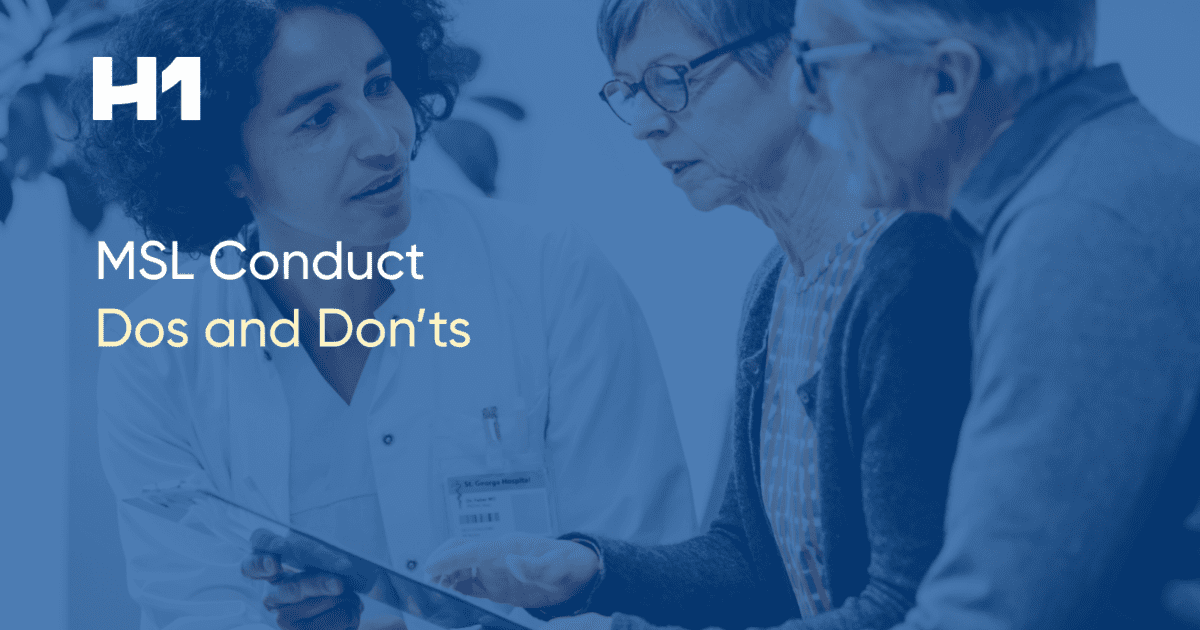Complying with MSL Regulations

MSLs Walking the Fine Line
Medical Science Liaisons (MSLs) are members of the Medical Affairs departments in pharmaceutical companies and have a wide range of responsibilities. An important part of the MSL role is interacting with healthcare providers to educate them about the science behind “their” drugs, e.g. discussing clinical data and explaining the mechanism of action of the compound.
MSLs are field-based professionals, but – as opposed to sales reps – their roles are strictly non-commercial: any communication with an HCP about their company’s products has to be strictly scientific and non-promotional.
The Framework
As a general rule, the same laws and regulations apply to Medical Affairs personnel that apply to Sales and Marketing personnel, including The Food, Drug, and Cosmetic Act (FDCA) and the Anti-Kickback Statute (AKS).
“FDA holds the medical affairs department to the same standards as it does sales reps. It’s important to keep from blurring the lines between promotion and responses to unsolicited requests.”
Tom Abrams – Director of the FDA’s Office of Prescription Drug Promotion (OPDP)
Medical Affairs departments therefore need to make sure that their interactions with HCPs and patients remain non-promotional and focus exclusively on scientific data and facts. That raises the question, of where exactly the fine line between promotional activity and scientific information lies.
Promotion is typically understood to include any activity by the drug manufacturer and by extension its representatives, that conveys product attributes, such as efficacy or safety. It does not matter, whether this communication is made orally or in writing, whether it is printed in a brochure, spread via social media, included in a poster – or any other of many possible ways.
Scientific exchange, on the other hand, includes the “dissemination and discussion of scientific research and/or medical findings without making promotional claims about a product.” The purpose of scientific exchange is also different: it is undertaken to disseminate scientific information rather than promoting a product. One of the requirements, therefore, is that the scientific exchange is conducted by scientifically trained personnel, in short, an MSL. In conveying information, the MSL has to stick with the data at all times and avoid making any scientifically unsupported claims.
From an organizational point of view, the company needs to separate the commercial side, e.g. sales and marketing from the scientific side represented by the Medical Affairs department. That includes making sure that commercial functions can’t influence Medical Affairs and that the incentive structure within the Medical Affairs department does not reward commercial activities and outcomes.
Off-Label Drug Use, a Hot Topic
One of the challenges MSLs encounter on a regular basis is handling discussions of off-label drug use with healthcare providers. Off-label drug use discussions are a hot topic and ultimately come down to the following distinction: while MSLs can answer questions about off-label use asked by the healthcare provider (unsolicited requests), volunteering such information is a no-no. Not crossing this fine line by offering up off-label information to a HCP that did not specifically asked for it can make the difference between joining a list of companies which paid large settlements for off-label promotion of drugs – or not.
That leaves the MSL to negotiate another fine line: that between unsolicited and solicited off-label information.
The FDA considers requests for off-label information that are “prompted in any way” by a manufacturer or its representatives to be “solicited” and with that potentially as evidence that the company intended to promote the drug outside of what was specifically approved by the FDA.
The “prompted in any way” can take many forms, including (but not limited to):
- The MSL prompting the HCP to ask questions about off-label use of drugs or medical devices
- Sending tag teams of sales reps and MSLs to HCPs with the intent of having the MSL discuss off-label uses
- Developing KOLs to support and promote off-label use
- Incentivizing and promoting MSLs based on sales metrics
It is indeed a fine line MSLs must walk every day and clear policies on how to handle off-label information as well as standard operating procedures (SOPs) help them navigate this challenge and stay on the right side of that line. Another safeguard companies are adopting is requiring HCPs to sign professional inquiry request (PIK) forms to verify that they requested specific off-label information.
By adhering to these procedures MSLs can make sure they do not venture across any of the fine lines that separate commercial from scientific and solicited from unsolicited discussions.

 HCP Universe
HCP Universe Trial Landscape
Trial Landscape